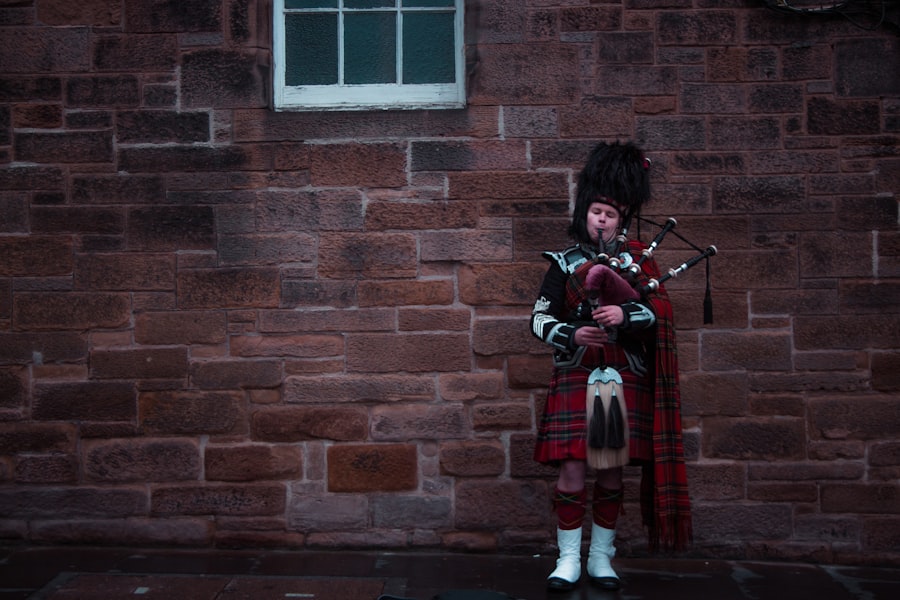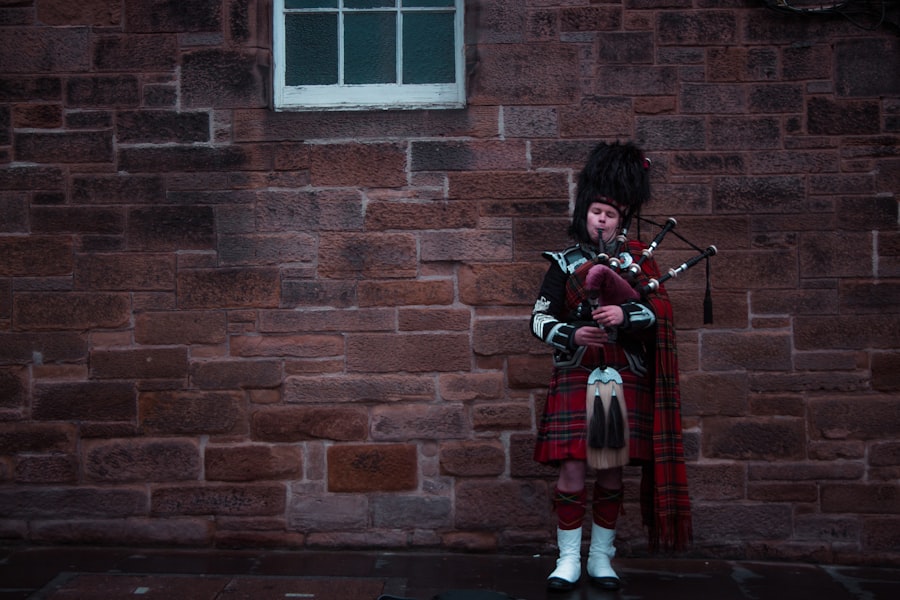The tradition of the wedding piper has deep roots in the cultural heritage of Scotland and Ireland, tracing back centuries. Bagpipes, with their distinctive sound, have long been associated with celebrations, particularly weddings.
Historically, the presence of a piper at a wedding was not merely for entertainment; it was a way to honour the couple and their families, marking the significance of the occasion.
The earliest records of pipers at weddings date back to the Middle Ages, when they were often employed to accompany processions and signal important moments during the ceremony. As you delve into the history of the wedding piper, you will discover that these musicians were often seen as integral to community life. In rural areas, where social gatherings were few and far between, a wedding was a major event, and the piper played a crucial role in setting the tone.
The music of the bagpipes resonated through the hills and valleys, drawing people together to celebrate love and unity. Over time, this tradition evolved, but the essence remained: the wedding piper is a symbol of joy, heritage, and connection.
Summary
- The tradition of the wedding piper dates back to ancient Celtic and Gaelic cultures, where they were seen as a symbol of good luck and prosperity for the newlyweds.
- In Scottish and Irish traditions, the wedding piper plays a crucial role in leading the bridal party to the ceremony, serenading the couple during the ceremony, and leading the newlyweds out as a married couple.
- Bagpipes at weddings symbolize the blending of two families and the start of a new journey together, while also evoking a sense of pride and heritage.
- To incorporate a wedding piper into your ceremony, consider having them play as guests arrive, lead the processional, perform during key moments of the ceremony, and lead the recessional.
- When choosing a wedding piper, consider their experience, repertoire, and ability to tailor their performance to suit your specific wedding theme and atmosphere.
The Role of the Wedding Piper in Scottish and Irish Traditions
In both Scottish and Irish cultures, the wedding piper holds a revered position. Traditionally, the piper would lead the bridal party to the ceremony, playing lively tunes that would uplift spirits and create an atmosphere of festivity. This role is not just about music; it embodies a sense of pride and honour for both families involved.
The piper’s presence signifies respect for tradition and a celebration of cultural identity. During the ceremony itself, the piper often plays at key moments, such as when the couple exchanges vows or during the signing of the register. This musical accompaniment enhances the emotional weight of these significant events, allowing guests to feel more connected to the moment.
In many cases, the piper will also play during the reception, encouraging guests to dance and celebrate. The music serves as a bridge between generations, connecting those who have come before with those who are celebrating in the present.
The Symbolism and Significance of Bagpipes at Weddings

Bagpipes are steeped in symbolism, representing not only cultural heritage but also emotional depth. The sound of bagpipes evokes a range of feelings—from joy and celebration to nostalgia and reflection. When played at weddings, they serve as a reminder of love’s enduring nature and the bonds that unite families.
The music can stir memories of past celebrations while simultaneously creating new ones for the couple and their guests. Moreover, bagpipes are often associated with honouring ancestors and traditions. By incorporating a piper into your wedding, you are paying homage to those who have come before you, acknowledging their influence on your life and love story.
This connection to heritage can be particularly meaningful for couples who wish to celebrate their roots or who have family ties to Scotland or Ireland. The presence of a piper thus becomes a powerful symbol of continuity and belonging.
How to Incorporate a Wedding Piper into Your Ceremony
Incorporating a wedding piper into your ceremony can be a seamless process with careful planning. First, consider when you would like the piper to perform. Many couples choose to have the piper play during key moments such as the arrival of guests, the entrance of the bridal party, or even during the signing of the register.
Each of these moments can be enhanced by the stirring sound of bagpipes, creating an unforgettable atmosphere. You might also want to think about specific tunes that resonate with you as a couple. Traditional Scottish or Irish wedding marches are popular choices, but you can also select songs that hold personal significance.
Discussing your preferences with your chosen piper will ensure that they can tailor their performance to suit your vision for the day. Additionally, consider how you would like to integrate other elements into your ceremony—perhaps a traditional dance or a moment for guests to join in singing along to familiar tunes.
Choosing the Right Wedding Piper for Your Special Day
Selecting the right wedding piper is crucial for ensuring that your vision comes to life on your special day. Start by researching local pipers who specialise in weddings; many will have websites showcasing their experience and repertoire. It’s essential to read reviews and testimonials from previous clients to gauge their professionalism and performance quality.
Once you have shortlisted potential pipers, arrange meetings or phone calls to discuss your plans in detail. This is an opportunity for you to assess their personality and see if they align with your vision for your wedding. Ask about their experience with weddings similar to yours and whether they can accommodate any specific requests you may have regarding music or attire.
A good piper will not only be skilled in their craft but will also be enthusiastic about contributing to your celebration.
The Impact of the Wedding Piper on the Atmosphere and Emotions of the Ceremony

The presence of a wedding piper can significantly enhance the atmosphere of your ceremony. As soon as guests hear the distinctive sound of bagpipes, they are transported into a world rich with tradition and emotion. The music creates an immediate sense of anticipation and excitement, setting the stage for what is often one of the most important days in a couple’s life.
Moreover, bagpipes have an unparalleled ability to evoke emotions. Whether it’s a lively jig that gets everyone dancing or a poignant lament that brings tears to eyes, the music played by a piper can resonate deeply with guests. This emotional connection can transform your ceremony into an unforgettable experience, allowing everyone present to feel fully engaged in the celebration of love.
Modern Trends and Innovations in Wedding Piper Performances
While traditional bagpipe music remains popular at weddings, modern trends have seen innovative approaches emerge within this age-old practice. Many couples are now opting for unique arrangements that blend traditional tunes with contemporary songs, creating a fresh take on classic performances. This fusion allows couples to personalise their ceremonies while still honouring their heritage.
Additionally, some pipers are incorporating technology into their performances by using backing tracks or collaborating with other musicians. This can add layers to the music and create a more dynamic experience for guests.
Whether it’s combining bagpipes with strings or percussion instruments, these modern innovations can elevate your wedding’s musical landscape while still maintaining respect for tradition.
The Legacy and Future of the Wedding Piper Tradition
As you reflect on the legacy of the wedding piper tradition, it becomes clear that this practice is not merely about music; it is about connection—between people, cultures, and generations. The role of the piper has evolved over time but remains rooted in its historical significance. As more couples seek ways to honour their heritage while embracing modernity, it is likely that this tradition will continue to thrive.
Looking ahead, there is potential for further innovation within this space. As cultural exchanges become more common in our globalised world, we may see an even greater blending of musical styles and traditions at weddings. The wedding piper will undoubtedly remain an essential part of this evolving narrative, continuing to bring joy and emotion to celebrations for years to come.
By embracing both tradition and innovation, couples can ensure that this cherished practice endures while creating new memories that resonate through time.
If you are considering incorporating a wedding piper into your special day in Scotland, you might also be interested in exploring the charm of humanist wedding ceremonies in this beautiful country. Humanist ceremonies are deeply personal and can be tailored to include various traditional elements, such as a piper, making your wedding truly unique. For more insights on why humanist weddings are gaining popularity in Scotland and how they can make your ceremony even more memorable, read the related article The Rise of Humanist Wedding Ceremonies in Scotland.
FAQs
What is a wedding piper?
A wedding piper is a musician who plays the bagpipes at a wedding ceremony or reception. The sound of the bagpipes is often associated with traditional Scottish or Irish weddings, but it is also popular in other cultures for adding a unique and memorable touch to the celebration.
What role does a wedding piper play in a wedding?
The wedding piper typically plays a key role in setting the tone and atmosphere for the wedding. They may play as guests arrive, during the processional and recessional, and at other key moments in the ceremony. The sound of the bagpipes can create a sense of grandeur and tradition, adding a special touch to the occasion.
How do I find a wedding piper for my wedding?
You can find a wedding piper by searching online for local bagpipers or contacting local music schools or pipe bands. It’s important to book a wedding piper well in advance, as they are often in high demand for weddings and other events. You may also ask for recommendations from friends, family, or your wedding venue.
What should I consider when hiring a wedding piper?
When hiring a wedding piper, consider their experience, repertoire, and availability. It’s important to discuss the specific music you would like them to play, as well as any special requests or traditions you would like them to accommodate. You should also discuss logistics such as timing, location, and any specific requirements for the performance.
What kind of music does a wedding piper play?
A wedding piper typically plays traditional Scottish or Irish tunes, such as “Highland Cathedral,” “Amazing Grace,” or “Scotland the Brave.” However, they may also be able to accommodate other musical preferences and special requests. It’s important to discuss the music selection with the piper in advance to ensure they can meet your preferences.

